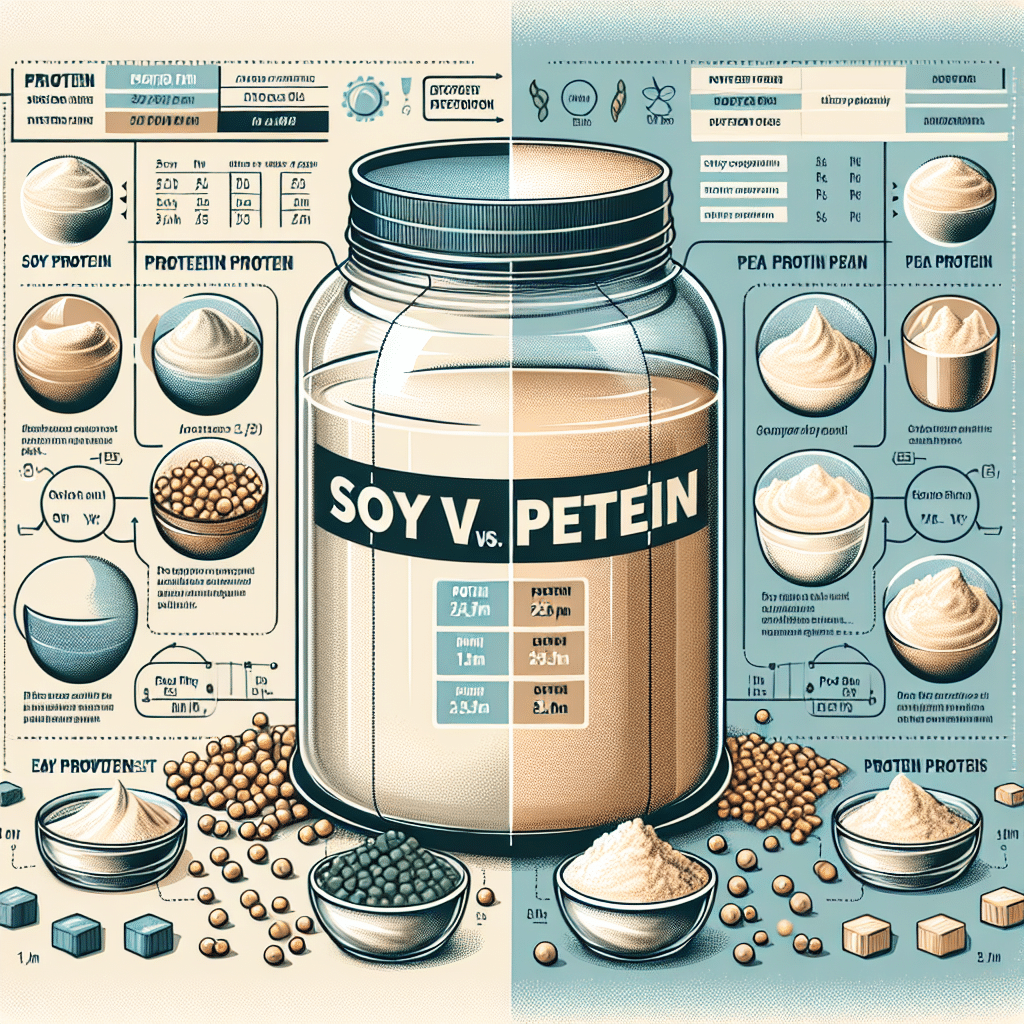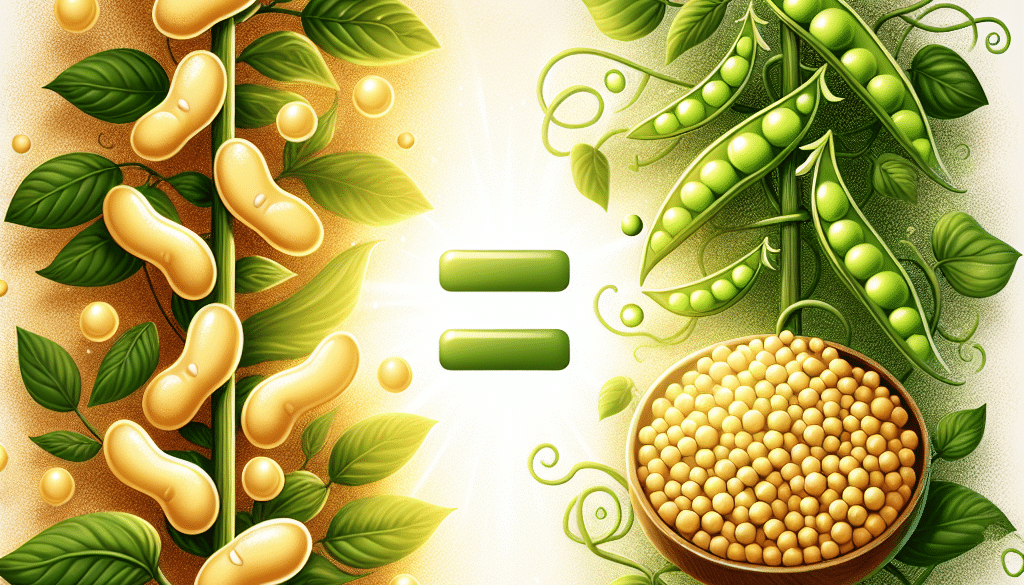Is Soy Protein Or Pea Protein Better For You?
-
Table of Contents
- Soy Protein vs. Pea Protein: Which is the Superior Plant-Based Protein?
- Understanding Soy Protein
- Nutritional Profile of Soy Protein
- Health Benefits of Soy Protein
- Potential Concerns with Soy Protein
- Understanding Pea Protein
- Nutritional Profile of Pea Protein
- Health Benefits of Pea Protein
- Potential Concerns with Pea Protein
- Comparative Analysis: Soy Protein vs. Pea Protein
- Amino Acid Profiles
- Digestibility
- Health Impact
- Environmental Considerations
- Conclusion: Making the Right Choice for Your Diet
- Discover ETprotein’s Premium Plant-Based Proteins
Soy Protein vs. Pea Protein: Which is the Superior Plant-Based Protein?

As the popularity of plant-based diets continues to rise, the debate over the best sources of vegan protein becomes increasingly relevant. Among the various options, soy protein and pea protein have emerged as two of the most popular contenders. This article delves into the nutritional profiles, health benefits, and potential drawbacks of both soy and pea proteins to determine which might be the better choice for your dietary needs.
Understanding Soy Protein
Soy protein is derived from soybeans, a legume that has been a staple in Asian diets for centuries. It is a complete protein, meaning it contains all nine essential amino acids that the human body cannot produce on its own. Soy protein is available in various forms, including soy protein isolate, soy protein concentrate, and textured soy protein.
Nutritional Profile of Soy Protein
- High in protein content, with about 90-95% protein in isolate form
- Contains isoflavones, compounds with antioxidant properties
- Low in fat and carbohydrates
- Cholesterol-free
Health Benefits of Soy Protein
- May reduce the risk of heart disease by lowering LDL cholesterol
- Can help with weight management due to its satiating effect
- Supports muscle growth and repair, making it popular among athletes
- Potentially beneficial for bone health
Potential Concerns with Soy Protein
- Contains phytoestrogens, which have been the subject of debate regarding hormonal balance
- Most soy is genetically modified, although non-GMO options are available
- May cause allergies in some individuals
Understanding Pea Protein
Pea protein is extracted from yellow split peas and has gained attention for being a hypoallergenic and environmentally friendly protein source. Like soy protein, it is also available in isolate and concentrate forms.
Nutritional Profile of Pea Protein
- Rich in protein, with isolate forms containing up to 85-90% protein
- High in branched-chain amino acids (BCAAs), particularly arginine
- Low in fat and does not contain cholesterol
- Free from common allergens like gluten, soy, and dairy
Health Benefits of Pea Protein
- Supports muscle growth and recovery due to its BCAA content
- May aid in weight loss by promoting feelings of fullness
- Has a lower environmental impact compared to animal-based proteins
- Typically non-GMO and sustainable
Potential Concerns with Pea Protein
- Not a complete protein on its own but can be complemented with other plant proteins
- May have a distinct taste that some people find unappealing
Comparative Analysis: Soy Protein vs. Pea Protein
When comparing soy and pea proteins, several factors come into play, including their amino acid profiles, digestibility, and potential health impacts.
Amino Acid Profiles
Soy protein is a complete protein, which gives it an edge over pea protein. However, pea protein is particularly rich in arginine, an amino acid beneficial for heart and muscle health. By combining pea protein with other plant-based proteins, you can achieve a complete amino acid profile.
Digestibility
Both soy and pea proteins are considered highly digestible, with soy protein having a slightly higher digestibility score. This means that the body can efficiently utilize the amino acids present in soy protein.
Health Impact
Soy protein’s potential effects on hormonal balance have been a concern for some, although research suggests that moderate consumption is safe for most people. Pea protein, on the other hand, is less controversial and is often recommended for those with food sensitivities or allergies.
Environmental Considerations
Pea protein is often lauded for its lower environmental footprint compared to soy protein, which is frequently associated with deforestation and high pesticide use. However, sustainably sourced and organic soy protein options are available for environmentally conscious consumers.
Conclusion: Making the Right Choice for Your Diet
Both soy and pea proteins offer unique benefits and can be excellent additions to a plant-based diet. The choice between them should be based on individual dietary needs, health concerns, taste preferences, and environmental considerations. For those with soy allergies or sensitivities, pea protein is an excellent alternative. Conversely, those looking for a complete protein source might prefer soy protein.
Ultimately, a varied diet that includes different plant proteins can provide a well-rounded nutritional profile and cater to personal health goals.
Discover ETprotein’s Premium Plant-Based Proteins
If you’re looking to incorporate high-quality plant-based proteins into your diet, ETprotein offers a range of organic and non-GMO options. Their products, including organic pea protein and soy protein, are designed to meet the needs of health-conscious consumers and are backed by rigorous quality standards.
ETprotein’s commitment to sustainability and purity ensures that you’re not only nourishing your body but also supporting environmentally responsible practices. Whether you’re an athlete, a vegan, or simply looking to improve your health, ETprotein has a protein solution for you.
About ETprotein:
ETprotein, a reputable protein and L-(+)-Ergothioneine (EGT) Chinese factory manufacturer and supplier, is renowned for producing, stocking, exporting, and delivering the highest quality organic bulk vegan proteins and L-(+)-Ergothioneine. They include Organic rice protein, clear rice protein, pea protein, clear pea protein, watermelon seed protein, pumpkin seed protein, sunflower seed protein, mung bean protein, peanut protein, and L-(+)-Ergothioneine EGT Pharmaceutical grade, L-(+)-Ergothioneine EGT food grade, L-(+)-Ergothioneine EGT cosmetic grade, L-(+)-Ergothioneine EGT reference grade and L-(+)-Ergothioneine EGT standard. Their offerings, characterized by a neutral taste, non-GMO, allergen-free attributes, with L-(+)-Ergothioneine purity over 98%, 99%, cater to a diverse range of industries. They serve nutraceutical, pharmaceutical, cosmeceutical, veterinary, as well as food and beverage finished product distributors, traders, and manufacturers across Europe, USA, Canada, Australia, Thailand, Japan, Korea, Brazil, and Chile, among others.
ETprotein specialization includes exporting and delivering tailor-made protein powder and finished nutritional supplements. Their extensive product range covers sectors like Food and Beverage, Sports Nutrition, Weight Management, Dietary Supplements, Health and Wellness Products, and Infant Formula, ensuring comprehensive solutions to meet all your protein needs.
As a trusted company by leading global food and beverage brands and Fortune 500 companies, ETprotein reinforces China’s reputation in the global arena. For more information or to sample their products, please contact them and email sales(at)ETprotein.com today.














